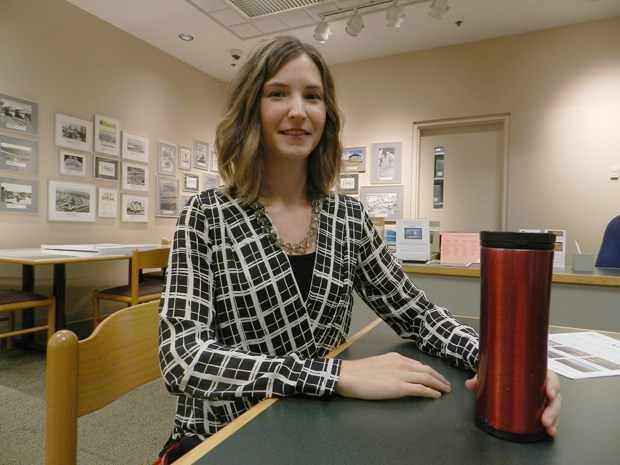When Jennifer Yuhasz took her first steps into the world of documenting history, she didn’t have to go very far.
As a grade schooler, she simply explored her grandparents’ yard on the family cattle and wheat farm two hours southeast of Regina, Saskatchewan.
There, she came across all manner of buried “gems” that told stories about life on the property, from old bottles and cans to a large meat slicer common in the local stores.
“I think I was the only kid that was thrilled when their grandfather brought in an old, Co-op meat slicer with great big rusty blades,” said Yuhasz, 32, the City of Richmond’s new archivist. “My mom wasn’t so happy. But my curiosity about relics and antiques probably came from a love of reading. My mom was a librarian and she’d always read to me.”
While the majority of what Yuhasz came across on the family property were everyday items, it was the stories they could tell that fascinated her. It’s an interest she developed and took with her when she studied to become an archivist at UBC’s School of Library Archives and Information Studies after majoring in history in Saskatoon at the University of Saskatchewan.
While that type of vocation may not be for everyone, Yuhasz said the attraction for her was immediate.
“I remember having to do research for a project and had to go to the University of Saskatchewan archives and just fell in love with the place,” she said. “It was fascinating that I could see how things were in the past and how people lived their daily lives.”
Today, after completing a Masters of Archival Studies at UBC, Yuhasz has been immersed in that world that allows the public to travel back in time for a glimpse of how things were.
That’s the payoff for her when the public make requests of the local archives and then come into the offices in the Richmond Cultural Centre to review the materials.
“You actually get to see the past,” she said. “And I was always interested in social history. You can really only glean that information in bits and pieces in archival records.”
While that may be dry in places — when it comes to sheets of historical documents — it can fill in gaps in a search that can mean a lot to someone who is, perhaps, interested in their family’s history.
Luckily for Yuhasz, her family was good at passing down family stories that help paint a more complete picture.
“My grandparents, on my dad’s side, were good storytellers,” she said. “They would take us out to their old farmhouses where they grew up and we’d explore them.”
That type of immediate connection to the past is vital, Yuhasz said.
“It’s also important because I asked. A lot of kids and grandkids don’t necessarily think of asking those questions until their parents or grandparents are gone,” she said. “But I was always interested from a young age. So, I always asked questions.”
That natural curiosity hasn’t waned with age.
“I recently did an oral history interview with my grandparents, which actually didn’t go over very well,” Yuhasz said with a chuckle. “They didn’t like speaking on a recorder. They just completely clammed up. That was quite funny. But it’s very important to have that type of connection to ask about family history and genealogy.”
It’s also a chance to conduct a little but of “detective work” when it comes to piecing together materials to get an overall view of a time and place.
“I don’t think archival work is for everybody, but it is for me,” Yuhasz said, adding her job in Richmond is a good fit because it represents a culmination of her work experiences elsewhere which included stops at the City of Vancouver Archives, Vancouver Maritime Museum and the Jewish Museum and Archives of B.C.
“Working in the City of Vancouver, then going to the maritime museum to learn about the canning, the shipping industries, and later moving to the Jewish museum to learn about immigration and building a community across B.C., it’s been a great learning experience that helped me prepare for where I am now,” she said.



